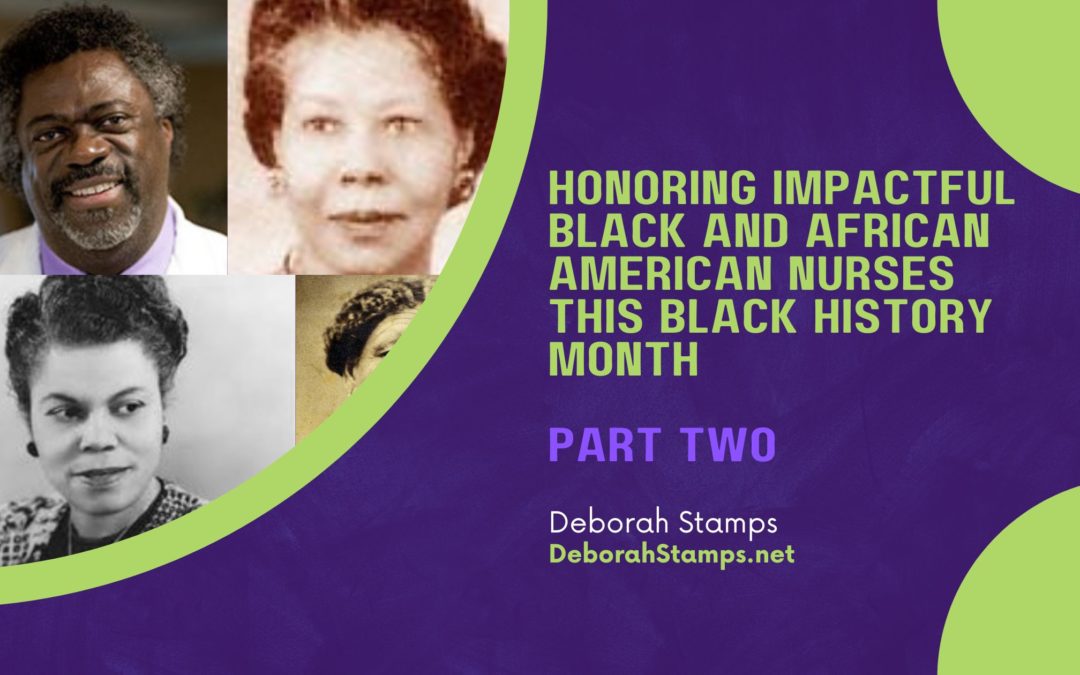Throughout history, African-American nurses have shown their integrity, resilience, and perseverance in pursuing their professional goals and positions.
Chi Eta Phi Sorority, Inc ( Home – Chi Eta Phi Sorority, Inc Chi Eta Phi Sorority, Inc) and the National Black Nurses Association (NBNA) are incredible institutions that strive to “improve the health of African Americans. This improvement is achieved through the provisions of culturally competent health care services in community-based health programs.”
Despite the progress that has been made in addressing the microaggressions and prejudices that African-American nurses face in the US, there is still a lot of work to be done. The strength and grit these individuals have shown in the past can still be seen in the nursing profession.
Mary Seacole
Mary Seacole, a mixed-race nurse, provided care for the troops on the frontlines during the Crimean War. Before being rejected for a nursing position in Crimea, Seacole traveled the world and cared for cholera patients. Despite her rejection, Seacole continued to provide care for the soldiers. The troops called her “Mother Seacole” because of her actions. In 2004, thousands of people voted for her to become the “Greatest Black British” individual. A statue of her was also unveiled in London in 2016.
Adah Belle Thoms
Adah Belle Thoms was appointed assistant superintendent of nurses at Lincoln Hospital in New York in 1906. However, due to her race, she could not receive the title even though she spent nearly 20 years as director. She later cofounded the National Association of Colored Graduate Nurses. She later lobbied for African-Americans to be able to serve as nurses in the Army and Red Cross nursing corps during WWI.
Mary Elizabeth Carnegie
Dr. Mary Elizabeth Carnegie was a distinguished nurse and author dedicated her life to fighting for the recognition of African-American nurses. She was also a respected mentor to many of the nursing profession’s leaders. She served as the president of the ANP from 1978 to 1979. In 1994, she was given the Living Legend award, the highest honor the nursing profession gave.
From 1988 to 1999, Carnegie chaired the American Nurses Association’s Minority Fellowship Program Advisory Committee. From 1945-153, she also serves as Dean and professor at the School of Nursing at Florida A&M University.
Hazel Johnson-Brown
In 1955, Hazel Johnson-Brown joined the military right after President Harry Truman abolished discrimination in the US Armed Forces. As a result, she became the first African-American woman to serve as the director of an Army nursing institute.
In 1979, Johnson-Brown was nominated as the 16th chief nurse of the Army Nurse Corp. She was then promoted to the rank of brigadier general. Following her retirement from the military, she worked as a professor at George Mason University and Georgetown University.
Eddie Bernice Johnson
Eddie Bernice Johnson is the first African-American woman to be elected to Congress and the first nurse to serve as the ranking member of the Science, Space, and Technology Committee.
Eddie Bernice Johnson made history as the first female African-American psychiatric nurse at a Veterans Affairs facility in Dallas. After the Voting Rights Act was passed in 1965, she became the first Black woman to represent Dallas in the Texas House of Representatives.
Catherine Alicia Georges
Catherine Alicia Georges is professor and chair of the Department of Nursing at Lehman College and the Graduate Center of the City University of New York, an author and a nurse. Most notably, she served as the former president of the Board of Directors for AARP and is also president of the National Black Nurses Foundation.
She has served as president of the board of the Commission on Graduates of Foreign Nursing Schools, a fellow of the American Academy of Nursing and of the New York Academy of Medicine, on the boards of AARP, Black Women’s Health Study, and on the U.S. Department of Health and Human Services Advisory Council on Nursing Education and Practice, the New York State Governor’s Health Care Advisory Board, the American Association of Colleges of Nursing Diversity and Inclusion Committee, and the Children’s Aid Society Health Advisory Committee.
Darlene Clark Hine
Historian and professor Darlene Clark Hine has been known for researching the African-American experience. She is regarded as one of the most prominent professors at Michigan State.
In 2014, Barack Obama presented the National Humanities Medal to Darlene Clark Hine for her contributions to the field of African-American history. She was also acknowledged for her pioneering work on the intersection of gender, race, and class. Before becoming a historian, she served as a former president of two historical societies.
Beverly Malone
Beverly Malone is the president and chief executive officer of the nursing organization National League for Nursing. She previously worked as the head of a nursing college and the US Department of Health.
Beverly Malone’s passion for healthcare began when she was in the segregated South, where she worked alongside a great-grandmother who was a healer. Following her childhood, she became the first African-American woman to serve as the general secretary for the Royal College of Nursing. She also held various positions within the US Department of Health, including assistant secretary for health.
Aileen Ewell
A native of Virginia, Aileen Ewell graduated from the Washington, DC, hospital’s nursing school. She worked as a visiting nurse for the city’s Public Health Department before eventually becoming a maternity home executive director. In 1932, Aileen Ewell was one of the founders of the Chi Eta Phi Society at Howard University’s Freedman’s Hospital.
Martha Dawson
Martha Dawson is a globally recognized expert in healthcare administration and nursing. She currently works as an associate professor at the University of Alabama in Birmingham’s School of Nursing. Her work has been regarded as an inspiration for individuals in the field.
Katherine Detherage
Katherine Detherage is a distinguished African-American nurse who received her Ph.D. from Boston University and one of the first African Americans to receive her MSN (1974) MSN from the UK College Of Nursing. She was also a part of the faculty that established the University of Louisville’s nursing program. She has also taught at various universities, including Boston College, the University of Rochester, SUNY College at Brockport, and chaired the Departments of Nursing at St. John Fisher College and Nazareth College.
Katherine Detherage is the only African-American president of the New York State Nurses Association’s District II. Through her work in the field of nursing, she has been able to develop numerous research projects. In 2011, she was also awarded the Lyman T. Johnson Award for promoting diversity in the profession. In 2020 she was recognized as a trailblazer at the University of Kentucky College of Nursing for going on to excel and affect change in nursing and healthcare.
Margie Lovett-Scott
Margie Lovett-Scott is retired Faculty Emeriti from SUNY Brockport University. She is one of the first African American faculty appointed. Dr. Lovett-Scott joined the faculty of the Department of Nursing in 1982. Prior to joining the Brockport faculty, she directed Brockport’s Rochester Educational Opportunity Center’s nursing program for five years. She is certified as a family nurse practitioner and has certification in labor management from the School of Industrial and Labor Relations at Cornell University.
Dr. Lovett-Scott has presented widely on such topics as disparities in health care, cultural competence for health practitioners and traditional health practices of African-Americans. She spent the academic year 1995-1996 on sabbatical leave at the University of Ghana, West Africa, where she taught in the Department of Nursing, conducted research on the traditional health practices of Ghanaians, and served as a curriculum consultant.
She is actively involved in professional and community service. For seven years she served as president of the Board of Directors at Westside Health Services. She is a member of three professional honor societies, Delta Kappa Gamma Society International, Sigma Theta Tau International, and Chi Eta Phi International Nursing Sorority, Beta Chi Chi Chapter, and she is a member of the Genesee Valley Nurses Association. She is an active member of Zion Hill Missionary Baptist, where she serves on the Scholarship, Health Ministry Committee and the Board of Elders. Her primary research interests are in the areas of culture and health. She has written and published a book Global Health Systems, Comparing Strategies for Delivery of Health Services on Comparative Health Systems which she published in 2008.
Goldie D. Brangman
As a certified nurse anesthetist, Goldie Brangman has been able to mentor and assist other healthcare professionals around the world. She was also the first African-American president of an organization that focuses on training nurses and other healthcare workers. She was the founder of a nursing school that was established in Harlem. During one of her most notable roles, she was part of a team that treated Dr. King after he was shot in 1958.
Lillian Holland Harvey
Lillian Holland Harvey is known for her role in establishing the first bachelor’s degree in nursing program at Tuskegee Institute. Under her leadership, the school’s nursing program introduced hands-on experiences in hospitals. During her time as the school’s Dean, she also took the time to mentor and encourage students.
Linda Burnes Bolton
Chief nursing officer emeritus, received the 2022 Lifetime Legacy Award from the American Academy of Nursing. The award recognizes her leadership and contributions to nursing throughout her 50-year career to improve patient care, advance health equity and promote the nursing profession. She served as president of the American Organization of Nurse Executives, American Academy of Nursing, the American Organization of Nurse Executives and the National Black Nurses Association. She is a member of the National Academy of Medicine and served as vice-chair of the Institute of Medicine Committee on the Future of Nursing. In 2011, Modern Healthcare named her to its Top 25 Women in Healthcare.

